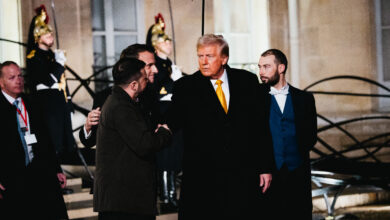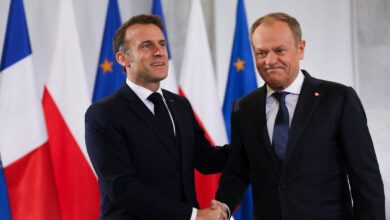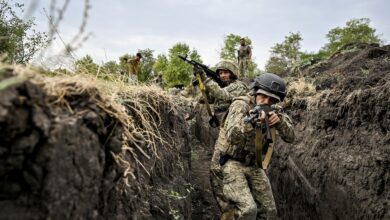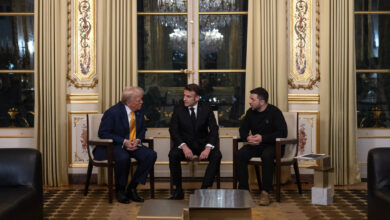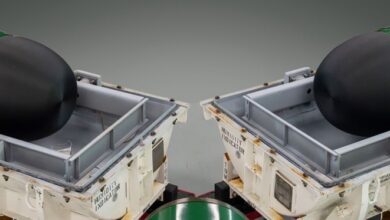President Donald Trump announced Friday that the United States would not abide by a U.N. treaty aimed at regulating the global conventional arms trade, calling it “misguided” and an encroachment on U.S. sovereignty.
The U.S. Senate never ratified the 2013 Arms Trade Treaty after former president Barack Obama endorsed it. Trump said he was revoking his predecessor’s signature.
“Under my administration, we will never surrender American sovereignty to anyone,” Trump said in a speech to the National Rifle Association in Indianapolis. “We will never allow foreign bureaucrats to trample on your Second Amendment freedom,” he said, referring to the constitutional right to bear arms.
“And that is why my administration will never ratify the U.N. Arms Trade Treaty. I hope you’re happy.… And I am officially announcing today that the United States will be revoking the effect of America’s signature from this badly misguided treatment [agreement]. We’re taking our signature back. The United Nations will soon receive a formal notice that America is rejecting this treaty.”
He said the actions reaffirmed “that American citizens live by American laws, not the laws of foreign countries.”
The treaty, which was adopted on April 2, 2013 by the U.N General Assembly, entered into effect in December 2014 and seeks to regulate international transfers of conventional weapons, as well as some ammunition, parts and components.
It requires member countries to establish control systems and keep records of international transfers of weapons for a minimum of 10 years.
It prohibits transfers that would violate U.N. Security Council measures including arms embargoes or if the weapons could be used in genocide, crimes against humanity, or other war crimes.
Transfers are also prohibited if there is a risk that weapons could be used to commit or facilitate violations of humanitarian or human rights law, terrorism or transnational organized crime, or where there is a risk the arms may be diverted.
While 130 countries originally signed the treaty, only 101 have ratified and joined it.
Of the world’s largest arms trading states, France, Germany, the United Kingdom, Spain and Italy, along with growing arms exporter South Korea have ratified the treaty.
But the top three, the United States, Russia and China, along with Ukraine, Israel have not, although the latter two are signatories.
White House says treaty is ‘simply not needed’
In a statement the White House said the treaty “fails to truly address the problem of irresponsible arms transfers, while providing a platform for those who would seek to constrain our ability to sell arms to our allies and partners.”
It also claimed that some groups are trying to use the treaty to overturn “sovereign national decisions” on arms exports – pointing to an effort by the Campaign Against the Arms Trade to block what the statement called the British government’s “legal transfer of arms to Saudi Arabia.”
“The ATT is simply not needed for the United States to engage in responsible arms trade,” the White House said.
On a background press call, a senior Trump administration official noted that “17 of the top 25 exporters of arms” including Russia and China are not parties to the treaty.
“The United States already has significant controls in place to regulate our conventional arms transfers. Other countries do not,” the official said.
The official also noted that the treaty is open for amendment in 2020, saying that there are “significant concerns about proposals that are out there” that could “further constrain what countries like the United States might do to undermine our sovereignty.”
UN praises treaty as ‘landmark achievement’
Asked about Trump’s announcement, the United Nations praised the arms trade treaty as a “landmark achievement” in efforts to ensure responsibility in international arms transfers.
Stephane Dujarric, the spokesperson for the U.N. Secretary-General, said the Arms Trade Treaty is “the only global instrument aimed at improving transparency and accountability in the international arms trade.”
He said the treaty was “particularly important in present times, when we witness growing international tensions and renewed interest in expanding and modernizing arsenals.
With reporting from AFP



